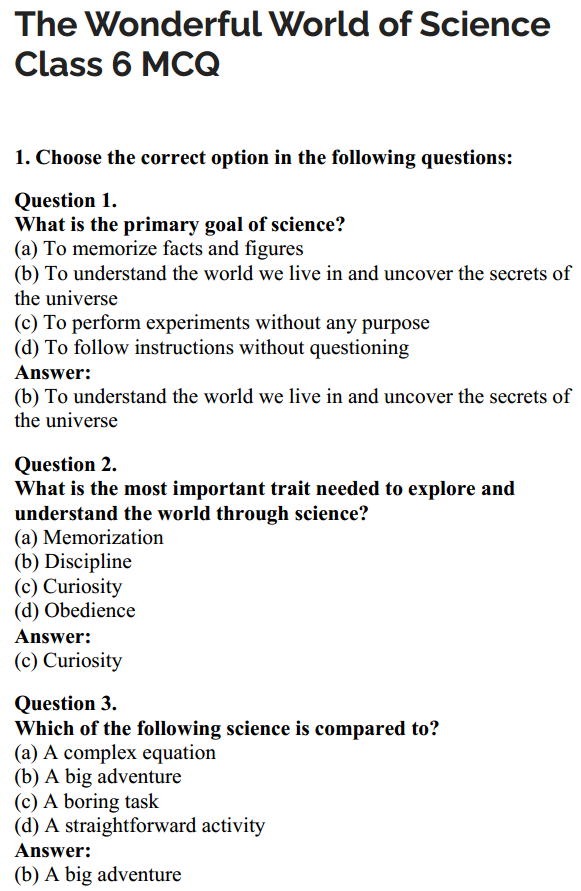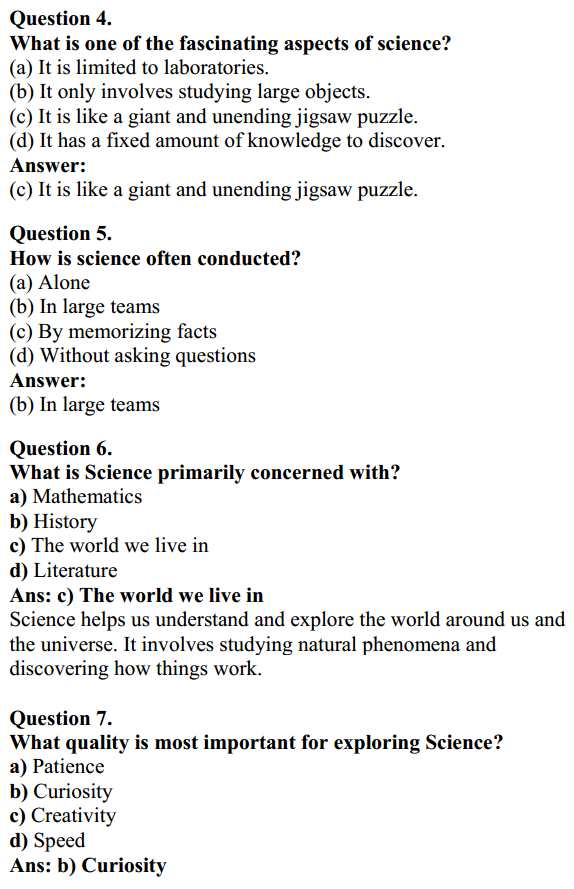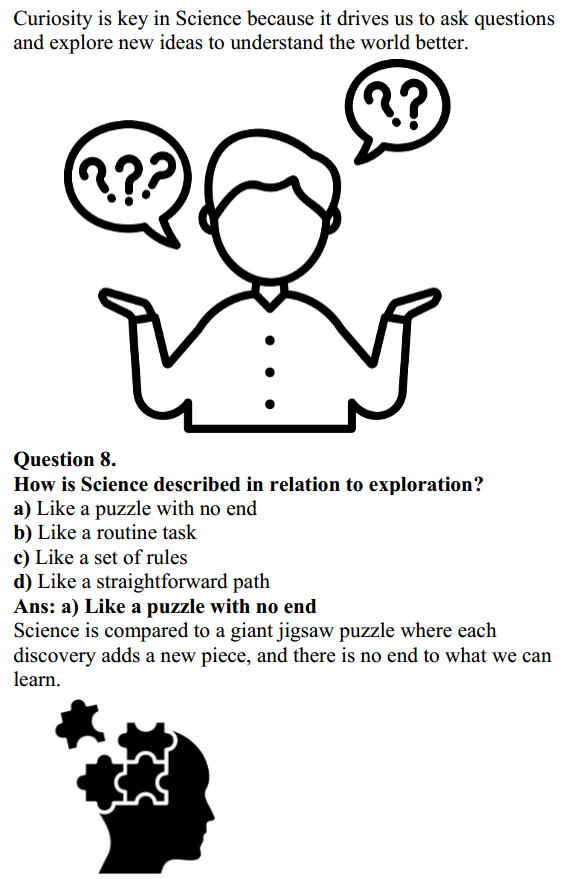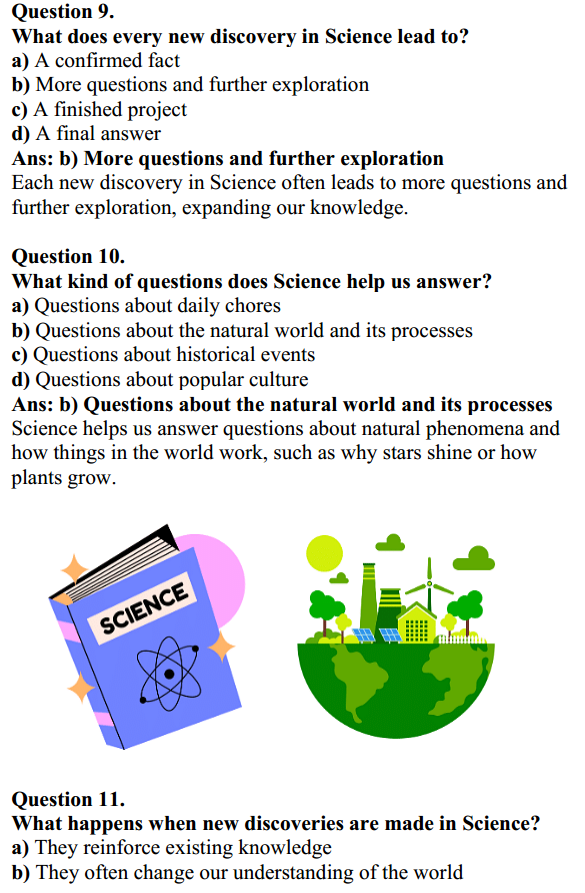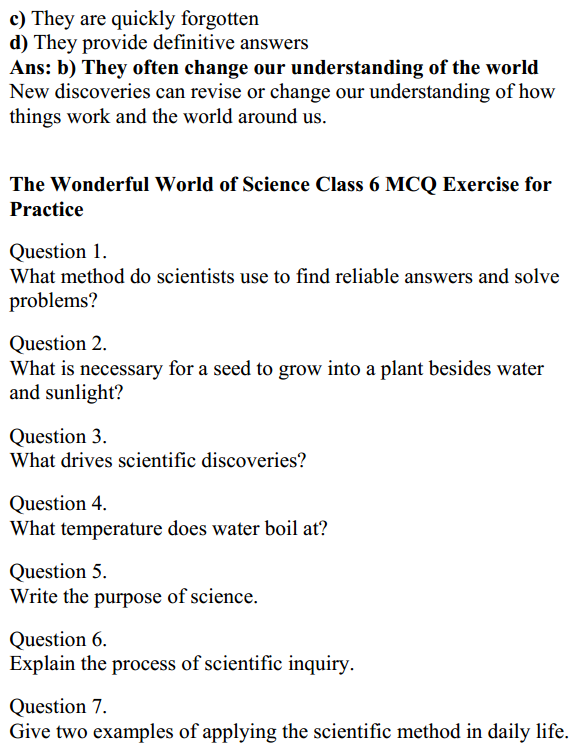MCQ on The Wonderful World of Science Class 6
Class 6 Science Chapter 1 MCQ The Wonderful World of Science
Multiple Choice Questions :
Question 1.
What motivates humans to explore, ask questions, and conduct experiments?
(a) The need for relaxation and leisure activities
(b) A focus on maintaining familiar habits
(c) To avoid new experiences
(d) Curiosity and the desire to understand the world
Answer:
(d) Curiosity and the desire to understand the world
Question 2.
What happens to water when it is cooled and heated respectively?
(a) It turns into a gas when cooled and a solid when heated
(b) It turns into ice when cooled and steam when heated
(c) It turns into a liquid when cooled and a solid when heated
(d) It remains unchanged when cooled or heated
Answer:
(b) It turns into ice when cooled and steam when heated
![]()
Question 3.
How do people understand the difference between hot and cold water?
(a) By measuring the water’s colour
(b) By using their sense of touch
(c) By observing the water’s movement
(d) By the sound the water makes
Answer:
(b) By using their sense of touch
Question 4.
Which of the following best describes the scientific method?
(a) A process of memorising information about different topic
(b) A step-by-step process for investigating questions, including observing, hypothesising, experimenting, analysing, and concluding
(c) A method of guessing answers without testing them
(d) A way to only analyse existing data without conducting new experiments
Answer:
(b) A step-by-step process for investigating questions, including observing, hypothesising, experimenting, analysing, and concluding
Question 5.
What is science primarily concerned with?
(a) History
(b) Mathematic
(c) Literature
(d) The world we live in
Answer:
(d) The world we live in
Question 6.
What quality is most important for exploring science?
(a) Patience
(b) Curiosity
(c) Creativity
(d) Speed
Answer:
(b) Curiosity
Question 7.
How is science described in relation to exploration?
(a) Like a puzzle with no end
(b) Like a routine tasks
(c) Like a set of rules
(d) Like a straightforward path
Answer:
(a) Like a puzzle with no end
Question 8.
What does every new discovery in science lead to ?
(a) A confirmed fact
(b) More questions and further exploration
(c) A finished projects
(d) A final answer
Answer:
(b) More questions and further exploration
![]()
Question 9.
What kinds of questions does science help us answer?
(a) Questions about daily chores
(b) Questions about the natural world and its processes
(c) Questions about historical events
(d) Questions about popular culture
Answer:
(b) Questions about the natural world and its processes
Question 10.
What happens when new discoveries are made in science?
(a) They reinforce existing knowledge
(b) They often change our understanding of the world.
(c) They are quickly forgotten
(d) They provide definitive answers
Answer:
(b) They often change our understanding of the world.
Assertion And Reasons :
Given below are two statements, one labelled as Assertion (A) and the other labelled as Reason (R)
(a) Both (A) and (R) are true and (R) is the correct explanation of (A)
(b) Both (A) and (R) are true and (R) is not the correct explanation of (A).
(c) (A) is true but (R) is false.
(d) (A) is false but (R) is true.
Question 1.
Assertion (A) : Science is just about memorising facts and figures or doing experiments.
Reason (R) : It is about following a step-by-step process that helps us find answers to our questions.
Answer:
(d) (A) is false but (R) is true.
Question 2.
Assertion (A) : Along with food, we need water to survive.
Reason (R) : Water is such a delightful substance.
Answer:
(b) Both (A) and (R) are true and (R) is not the correct explanation of (A).
![]()
Question 3.
Assertion (A) : Science is like a giant and unending jigsaw puzzle.
Reason (R): There is no limit to what we can discover, since every new piece of knowledge leads to more questions and more things to find out.
Answer:
(a) Both (A) and (R) are true and (R) is the correct explanation of (A)
Question 4.
Assertion (A) : We start exploring our surroundings and asking questions right from our childhood.
Reason (R): The most important thing is to have ‘speed’ to discover new things.
Answer:
(c) (A) is true but (R) is false.
Fill in The Blanks :
1. Some of the most ground breaking discoveries have often come from ________ places.
Answer:
unexpected
2. ________ is the first step in the scientific method.
Answer:
observation
3. Scientists are the people who follow the ________ to solve problems of to discover new things.
Answer:
scientific method
4. Scientists across the world ________ together.
Answer:
work
![]()
5. Science is about following a ________ process that helps us find answers to our questions.
Answer:
step-by-step
True or False :
1. There is always something new and exciting to discover.
Answer:
True
2. Science is like a giant and unending jigsaw pure puzzle.
Answer:
True
3. Human are naturally curious about the world around them.
Answer:
True
4. Always there is a limit to what we can discover.
Answer:
False
![]()
5. The natural curiosity is foundation of science.
Answer:
True
Very Short Answer Type Questions :
Question 1.
What do organisms need to support their growth?
Answer:
Organisms need food and water to support their growth.
Question 2.
What term is used for people who follow the scientific method to solve problems and make discoveries?
Answer:
Scientist
Short Answer Type Questions :
Question 1.
What is meant by the term scientific method?
Answer:
The scientific method is a step-by-step process used to investigate and answer questions about the world. It involves making observations, asking questions, forming a hypothesis, conducting experiments, analysing results, and drawing conclusions.
Question 2.
Why do scientists often work in teams?
Answer:
Scientists work in teams to combine diverse ideas and skills, making discoveries more exciting and effective. Teamwork allows them to tackle complex problems more efficiently and achieve impactful results.
